朱明zhubob-新思维综合英语3Unit12单元练习打印版
- 格式:doc
- 大小:66.54 KB
- 文档页数:8
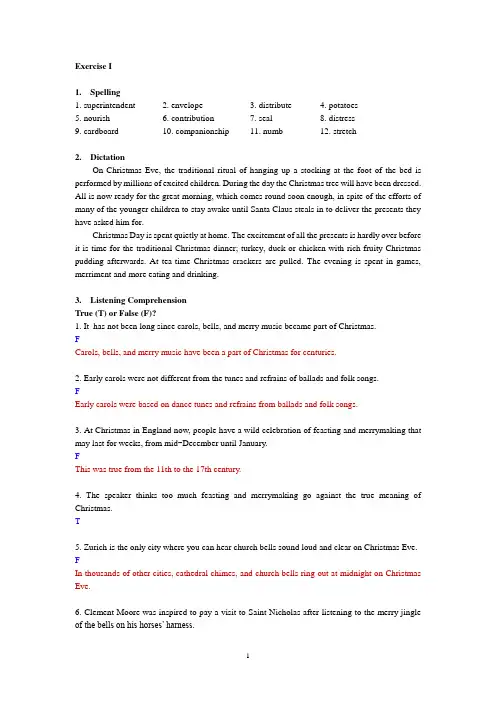
Exercise I1. Spelling1. superintendent2. envelope3. distribute4. potatoes5. nourish6. contribution7. seal8. distress9. cardboard 10. companionship 11. numb 12. stretch2. DictationOn Christmas Eve, the traditional ritual of hanging up a stocking at the foot of the bed is performed by millions of excited children. During the day the Christmas tree will have been dressed. All is now ready for the great morning, which comes round soon enough, in spite of the efforts of many of the younger children to stay awake until Santa Claus steals in to deliver the presents they have asked him for.Christmas Day is spent quietly at home. The excitement of all the presents is hardly over before it is time for the traditional Christmas dinner; turkey, duck or chicken with rich fruity Christmas pudding afterwards. At tea-time Christmas crackers are pulled. The evening is spent in games, merriment and more eating and drinking.3. Listening ComprehensionTrue (T) or False (F)?1. It has not been long since carols, bells, and merry music became part of Christmas.FCarols, bells, and merry music have been a part of Christmas for centuries.2. Early carols were not different from the tunes and refrains of ballads and folk songs.FEarly carols were based on dance tunes and refrains from ballads and folk songs.3. At Christmas in England now, people have a wild celebration of feasting and merrymaking thatmay last for weeks, from mid-December until January.FThis was true from the 11th to the 17th century.4. The speaker thinks too much feasting and merrymaking go against the true meaning ofChristmas.T5. Zurich is the only city where you can hear church bells sound loud and clear on Christmas Eve. FIn thousands of other cities, cathedral chimes, and church bells ring out at midnight on Christmas Eve.6. Clement Moore was inspired to pay a visit to Saint Nicholas after listening to the merry jingle of the bells on his horses’ harness.FHe was inspired by the bells to write a book called A Visit from Saint Nicholas.Script:Christmas MusicChristmas music is loved by all who hear and sing it every year. It includes some of the greatest compositions ever written for chorus and orchestra as well as the joyful melodies of the familiar Christmas carols. Carols, bells, and merry music have been a part of Christmas for centuries.Many of the early carols were based on dance tunes and refrains from ballads and folk songs. Later, during the Reformation the carols became gloomy, reflecting the dim view that the Puritans held regarding Christmas. This view came about because in England from the 11th to the 17th century, Christmas had become more and more a wild celebration of feasting and merrymaking that lasted for weeks, sometimes from mid-December until January. Because these feasts held in the great houses of England had little or no connection with the true meaning of Christmas, the Puritans outlawed Christmas. The observance of Christmas was forbidden by an act of Parliament in 1644. After the restoration of the monarchy in 1660, Charles II revived the custom. With the return of Christmas, the art of carol making and singing began anew. It is as popular today as it was in the 14th century.All over the world the ringing of bells is a part of the Christmas tradition. For hundreds of years, Zurich, Switzerland, has been famous for its beautiful bells. Every Christmas Eve the bells sound loud and clear to call families to church services. This ceremony is echoed in thousands of cities where cathedral chimes and church bells ring out at midnight. Bells are used as decorations on Christmas wreaths and as ornaments on trees to add a gay, tinkling note to Christmas gift wrappings. And as everyone knows, the most famous sleigh bells in the world belong to Santa Claus. It is said that Clement Moore, a professor at the General Theological Seminary in New York, was inspired to write A Visit from Saint Nicholas after listening to the merry jingle of the bells on his hor ses’ harnesses as he drove along on a frosty winter night.4. TranslationA. Translate the following sentences from Chinese into English.1. 这块料子摸上去像真丝。
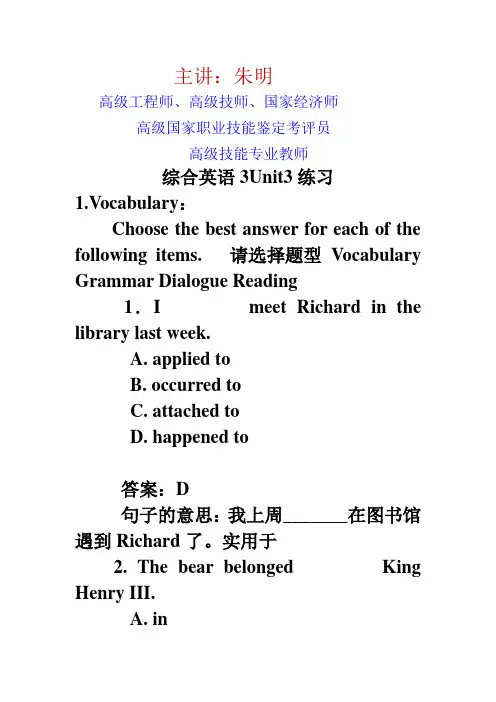
主讲:朱明高级工程师、高级技师、国家经济师高级国家职业技能鉴定考评员高级技能专业教师综合英语3Unit3练习1.Vocabulary:Choose the best answer for each of the following items. 请选择题型Vocabulary Grammar Dialogue Reading1.I meet Richard in the library last week.A. applied toB. occurred toC. attached toD. happened to答案:D句子的意思:我上周_______在图书馆遇到Richard了。
实用于2. The bear belonged King Henry III.A. inB. forC. toD. on答案:C本题考查动词短语belong to的用法,其中介词用to,表示“某物属于谁,是谁的财产”。
3. I the reasons for your anxiety, Mr Brown.A. appointB. appreciateC. applaudD. approach答案:B本句的意思:我能够______ 你焦虑的原因。
Appoint, 任命;appreciate, 理解,体会;applaud, 鼓掌,拍手;approach, 接近。
4. The of mankind has taken thousands of years.A. realizationB. circumstanceC. civilizationD. circulation答案:C句子的意思:人类的______经历了数千年。
Realization, 实现;circumstance, 情况,境况;civilization, 文明,教化,开化;circulation, 循环,流动,流通。
5. Her grandparents lost everything during the in the thirties.A. reservationB. revelationC. resolutionD. revolution答案:D句子的意思:在三十年代的_________她祖父母失去了一切。
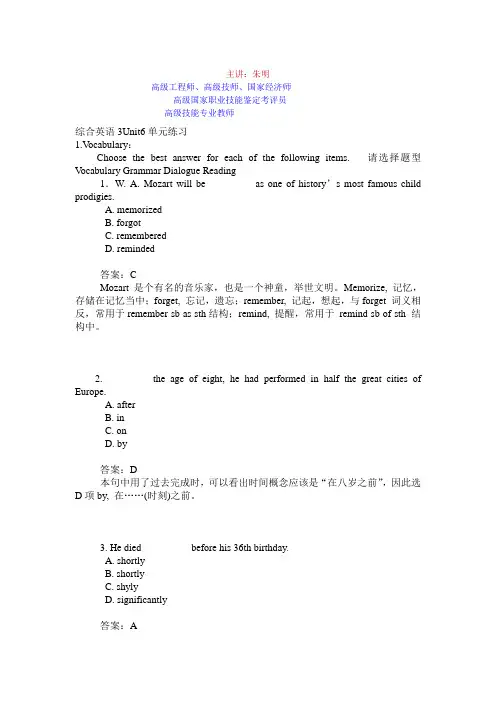
主讲:朱明高级工程师、高级技师、国家经济师高级国家职业技能鉴定考评员高级技能专业教师综合英语3Unit6单元练习1.V ocabulary:Choose the best answer for each of the following items. 请选择题型V ocabulary Grammar Dialogue Reading1.W. A. Mozart will be as one of history’s most famous child prodigies.A. memorizedB. forgotC. rememberedD. reminded答案:CMozart 是个有名的音乐家,也是一个神童,举世文明。
Memorize, 记忆,存储在记忆当中;forget, 忘记,遗忘;remember, 记起,想起,与forget 词义相反,常用于remember sb as sth结构;remind, 提醒,常用于remind sb of sth 结构中。
2. the age of eight, he had performed in half the great cities of Europe.A. afterB. inC. onD. by答案:D本句中用了过去完成时,可以看出时间概念应该是“在八岁之前”,因此选D项by, 在……(时刻)之前。
3. He died before his 36th birthday.A. shortlyB. shortlyC. shylyD. significantly答案:A考查副词词义。
Shortly, 不久,马上,常用在shortly before …, shortly after…中;strongly, 强烈地,坚决地;shyly, 害羞地;significantly, 重要地。
4. For centuries, people have been amazed by children of unusual .A. templeB. talentC. targetD. length答案:B句子意思是:几百年来,人们一直为具有非凡______的孩子所着迷。
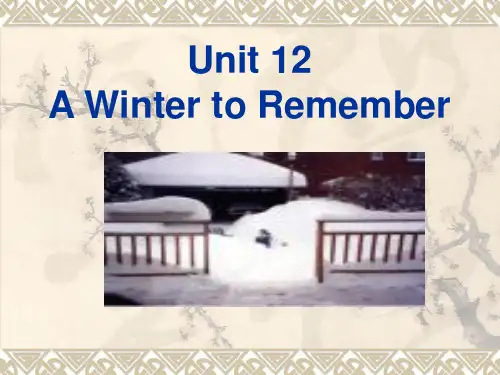
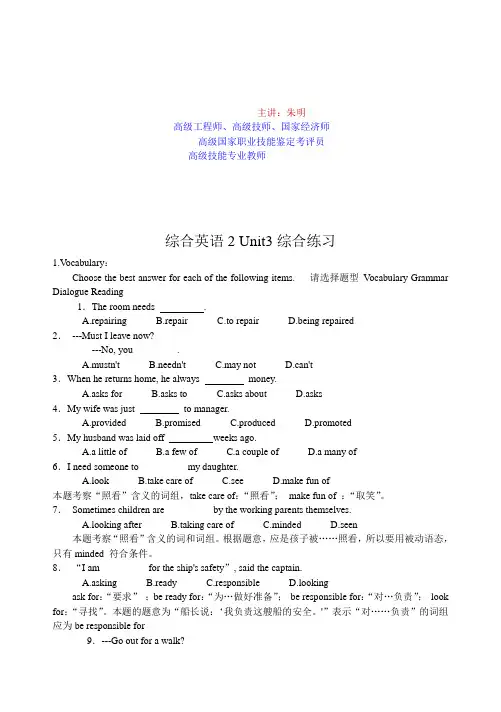
主讲:朱明高级工程师、高级技师、国家经济师高级国家职业技能鉴定考评员高级技能专业教师综合英语2 Unit3综合练习1.V ocabulary:Choose the best answer for each of the following items. 请选择题型V ocabulary Grammar Dialogue Reading1.The room needs .A.repairingB.repairC.to repairD.being repaired2.---Must I leave now?---No, you .A.mustn'tB.needn'tC.may notD.can't3.When he returns home, he always money.A.asks forB.asks toC.asks aboutD.asks4.My wife was just to manager.A.providedB.promisedC.producedD.promoted5.My husband was laid off weeks ago.A.a little ofB.a few ofC.a couple ofD.a many of6.I need someone to my daughter.A.lookB.take care ofC.seeD.make fun of本题考察“照看”含义的词组,take care of:“照看”;make fun of :“取笑”。
7.Sometimes children are by the working parents themselves.A.looking afterB.taking care ofC.mindedD.seen本题考察“照看”含义的词和词组。
根据题意,应是孩子被……照看,所以要用被动语态,只有minded 符合条件。
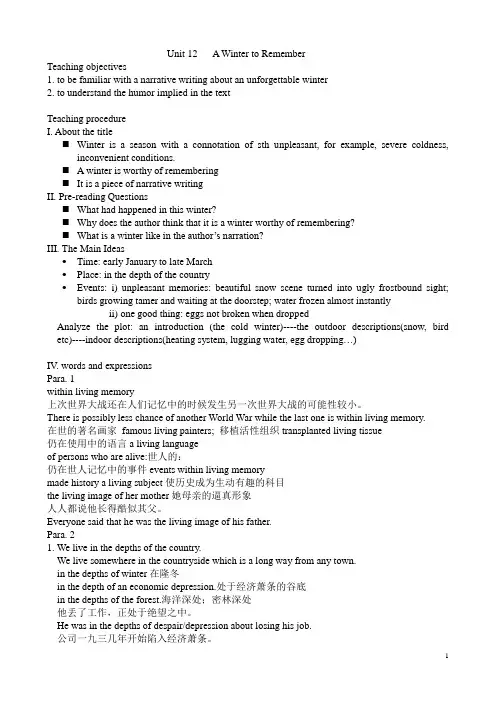
Unit 12 A Winter to RememberTeaching objectives1. to be familiar with a narrative writing about an unforgettable winter2. to understand the humor implied in the textTeaching procedureI. About the title⏹Winter is a season with a connotation of sth unpleasant, for example, severe coldness,inconvenient conditions.⏹ A winter is worthy of remembering⏹It is a piece of narrative writingII. Pre-reading Questions⏹What had happened in this winter?⏹Why does the author think that it is a winter worthy of remembering?⏹What is a winter like in the author’s narration?III. The Main Ideas•Time: early January to late March•Place: in the depth of the country•Events: i) unpleasant memories: beautiful snow scene turned into ugly frostbound sight;birds growing tamer and waiting at the doorstep; water frozen almost instantlyii) one good thing: eggs not broken when droppedAnalyze the plot: an introduction (the cold winter)----the outdoor descriptions(snow, bird etc)----indoor descriptions(heating system, lugging water, egg dropping…)IV. words and expressionsPara. 1within living memory上次世界大战还在人们记忆中的时候发生另一次世界大战的可能性较小。
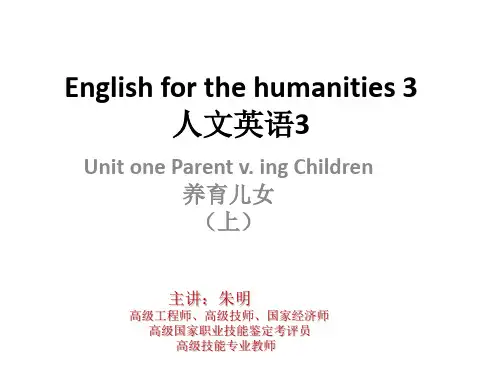
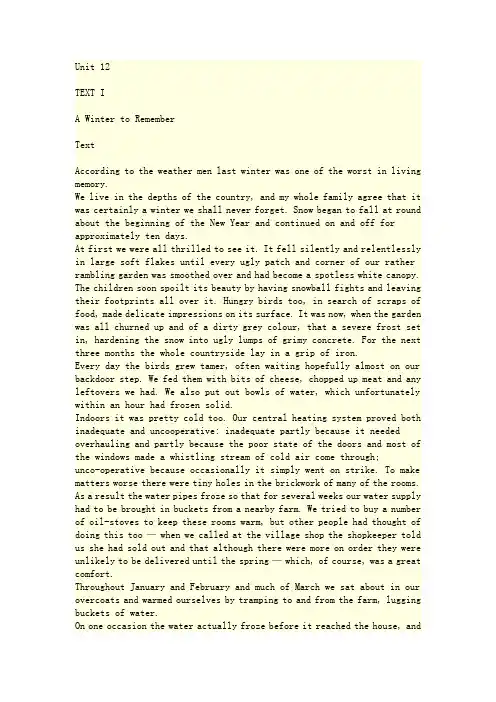
Unit 12TEXT IA Winter to RememberTextAccording to the weather men last winter was one of the worst in living memory.We live in the depths of the country, and my whole family agree that it was certainly a winter we shall never forget. Snow began to fall at round about the beginning of the New Year and continued on and off for approximately ten days.At first we were all thrilled to see it. It fell silently and relentlessly in large soft flakes until every ugly patch and corner of our rather rambling garden was smoothed over and had become a spotless white canopy. The children soon spoilt its beauty by having snowball fights and leaving their footprints all over it. Hungry birds too, in search of scraps of food, made delicate impressions on its surface. It was now, when the garden was all churned up and of a dirty grey colour, that a severe frost set in, hardening the snow into ugly lumps of grimy concrete. For the next three months the whole countryside lay in a grip of iron.Every day the birds grew tamer, often waiting hopefully almost on our backdoor step. We fed them with bits of cheese, chopped up meat and any leftovers we had. We also put out bowls of water, which unfortunately within an hour had frozen solid.Indoors it was pretty cold too. Our central heating system proved both inadequate and uncooperative: inadequate partly because it needed overhauling and partly because the poor state of the doors and most of the windows made a whistling stream of cold air come through;unco-operative because occasionally it simply went on strike. To make matters worse there were tiny holes in the brickwork of many of the rooms. As a result the water pipes froze so that for several weeks our water supply had to be brought in buckets from a nearby farm. We tried to buy a number of oil-stoves to keep these rooms warm, but other people had thought of doing this too —when we called at the village shop the shopkeeper told us she had sold out and that although there were more on order they were unlikely to be delivered until the spring —which, of course, was a great comfort.Throughout January and February and much of March we sat about in our overcoats and warmed ourselves by tramping to and from the farm, lugging buckets of water.On one occasion the water actually froze before it reached the house, andour youngest son — not the most intelligent of youth — promptly took it all the way back to the farm.However, one good thing did happen. One of the children dropped a container with a dozen eggs in it. I stooped down furiously to pick up what I thought would be the messy remains only to discover the eggs had come to no harm — they were as solid as if they had been hard-boiled.Late in March, it finally thawed. Water squirted from pipes in at least half a dozen places. Instead of carting buckets of water into the kitchen from the farm we now brought them in from different parts of the house. Eventually we found a plumber. The plumber undoubtedly saved us from drowning. I have been devoted to plumbers ever since.By Robert BestTEXT IIJanuary WindThe January wind has a hundred voices. It can scream, it can bellow, it can whisper, and it can sing a lullaby. It can roar through the leafless oaks and shout down the hillside, and it can murmur in the white pines rooted among the granite ledges where lichen makes strange hieroglyphics. It can whistle down a chimney and set the hearth-flames to dancing. On a sunny day it can pause in a sheltered spot and breathe a promise of spring and violets. In the cold of a lonely night it can rattle the sash and stay there muttering of ice and snowbanks and deep-frozen ponds. Sometimes the January wind seems to come from the farthest star in the outer darkness, so remote and so impersonal is its voice. That is the wind of a January dawn, in the half-light that trembles between day and night. It is a wind that merely quivers the trees, its force sensed but not seen, a force that might almost hold back the day if it were so directed. Then the east brightens, and the wind relaxes —the stars, its source, grown dim.And sometimes the January wind is so intimate that you know it came only from the next hill, a little wind that plays with leaves and puffs at chimney smoke and whistles like a little boy with puckered lips. It makes the little cedar trees quiver, as with delight. It shadow-boxes with the weather-vane. It tweaks an ear, and whispers laughing words about crocuses and daffodils, and nips the nose and dances off.But you never know, until you hear its voice, which wind is here today. Or, more important, which will be here tomorrow.By Hal Borland。
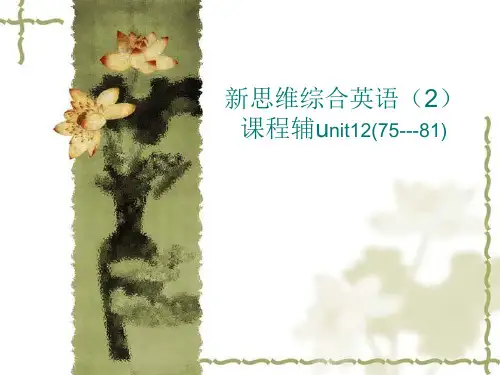
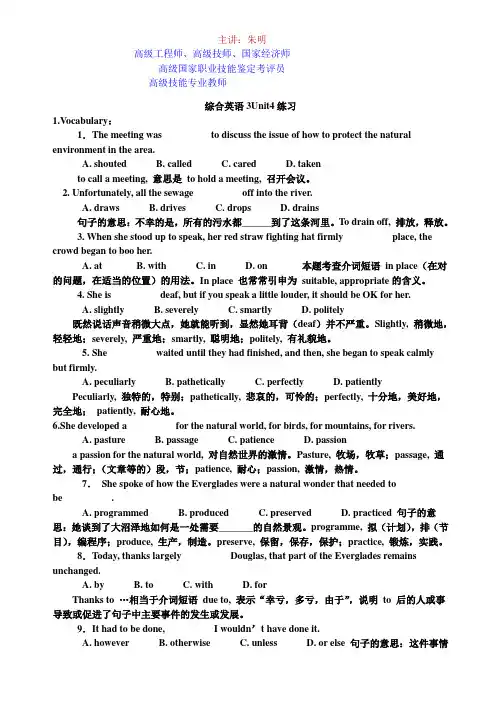
主讲:朱明高级工程师、高级技师、国家经济师高级国家职业技能鉴定考评员高级技能专业教师综合英语3Unit4练习1.Vocabulary:1.The meeting was to discuss the issue of how to protect the natural environment in the area.A. shoutedB. calledC. caredD. takento call a meeting, 意思是to hold a meeting, 召开会议。
2. Unfortunately, all the sewage off into the river.A. drawsB. drivesC. dropsD. drains句子的意思:不幸的是,所有的污水都______到了这条河里。
To drain off, 排放,释放。
3. When she stood up to speak, her red straw fighting hat firmly place, the crowd began to boo her.A. atB. withC. inD. on 本题考查介词短语in place(在对的问题,在适当的位置)的用法。
In place 也常常引申为suitable, appropriate的含义。
4. She is deaf, but if you speak a little louder, it should be OK for her.A. slightlyB. severelyC. smartlyD. politely既然说话声音稍微大点,她就能听到,显然她耳背(deaf)并不严重。
Slightly, 稍微地,轻轻地;severely, 严重地;smartly, 聪明地;politely, 有礼貌地。
5. She waited until they had finished, and then, she began to speak calmly but firmly.A. peculiarlyB. patheticallyC. perfectlyD. patientlyPeculiarly, 独特的,特别;pathetically, 悲哀的,可怜的;perfectly, 十分地,美好地,完全地;patiently, 耐心地。
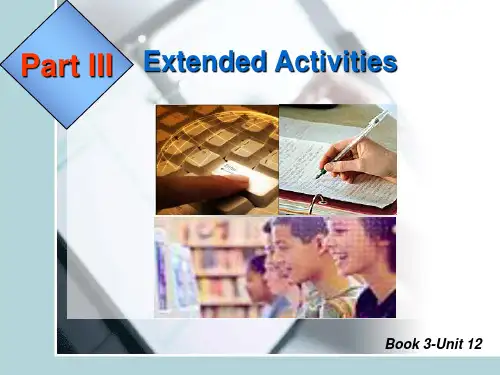
新思维综合英语3期末考试模拟试题预览说明:预览图片所展示的格式为文档的源格式展示,下载源文件没有水印,内容可编辑和复制新思维综合英语(3)期末考试模拟试题Section I V ocabulary (10 points)1. Butcher had set a new time _____ record for the first leg of the trip.A. limitB. recordC. scaleD. note2. Why people _______ these categories, however, is still a mystery.A. fail intoB. fall intoC. classify intoD. put into3. It is essential to know how to behave, but ______ yourself well is easier than you think.A. describingB. puttingC. presentingD. posing4. In Switzerland, it is considered ______ to take food with you to a dinner to someone’s house.A. definiteB. fortunateC. illegalD. impolite\\5. Charlie cancelled his trip to London because he couldn't get a _____ in time.A. passportB. victimC. friendD. vase6. Laurie strongly _______ with other’s opinion and is becoming very angry as she listened to them.A. maintainedB. approvedC. disagreedD. discouraged7. It took Jane a whole hour to figure _____ the algebra problem.A. atB. onC. overD. out8. As trade routes to Africa and Asia began to open ____, every aristocratic wanted to have exotic animals.A. awayB. upC. outD. in9. Miss Sinclair’s agency has given her two weeks to _____ from her experience.A. removeB. relaxC. releaseD. recover10. As long as the problem employees have jobs that are not ______, separating them is the simplest solution.A. difficultB. relatedC. interestingD. relayedSection II Structure (10 points)11. As the plane fell toward the water, survival suits _______.A. were distributingB. were distributedC. had distributedD. distributed12. Sometimes there is a true personality conflict _____ the manager can’t ignore.A. thisB. whatC. thatD. it13. Without immigrants, New York _______ a smaller, a poorer place, a lot less vital and exciting.A. had beenB. will beC. wasD. would have been\\14. It looks _______ you need a new machine if you don't want to wash all the clothes by hand.A. instead ofB. due toC. as ifD. so that15. ______ a strange experience that must have been!A. ThatB. WhatC. WhichD. How16. They are doing construction work outside my bedroom window, and the noise ________ me crazy.A. drivenB. was drivingC. has been drivingD. driving17. I’ll talk to the supplier ________ right away.A. have sent an orderB. sending an orderC. an order sendsD. have an order sent18. ________ from the town center, I’ll try my best to get there as soon as possible.A. No matter how remote the area isB. No matter how the area is remoteC. No matter how remote is the areaD. However remote the area is19. If I _____ finished, I _________ a lot of money eventually.A. would finish, would have madeB. had finished, would have madeC. finish, makeD. finished, made20. The people at the party ________ his sense of humor greatly last night.A. must be enjoyingB. must have enjoyedC. must enjoyD. must have been enjoyedSection III Cloze (20 points)The most extraordinary dream I ever _21_ was one in which I fancied that, as I was going into a theater, the clock-room attendant stopped me in the lobby and insisted on my _22_my legs behind. I was not surprised, but I was considerably annoyed.I said I had never heard of such a rule at any respectable theater _23_, and that I considered it a most absurd regulation. The man replied that he was very _24_, but that those were his instructions. People complained that they could not get to and from their _25_ comfortably, because other people’s legs were alwa ys in the way, and it had, therefore, been decided that _26_ should leave their legs outside. It seemed to me that the management, in making this order, had gone _27_ their legal right; and, under ordinary circumstances, I should have disputed it. However, I didn't want to _28_ a disturbance; so I sat down and meekly prepared to comply with the demand. I had never before _29_ that the human leg could be unscrewed. I had always thought it was more securely fixed. But the man showed me how to undo them, and I found that they came off quite easily.The discovery did not surprise _30_ any more than the original request that I should take them off. Nothing does surprise one in a dream.21. A. was B. saw C. had D. wanted22. A. leave B. leaves C. leaving D. left23. A. before B. after C. during D. so24. A. angry B. sorry C. friendly D. helpful25. A. homes B. jobs C. arms D. seats26. A. somebody B. everybody C. anybody D. nobody27. A. beyond B. from C. to D. around28. A. understand B. know C. make D. learn29. A. know B. known C. make D. learn30. A. him B. them C. me D. usSection IV Reading (20 points)Questions 31~35 are based on the following passage.One day, sixty-year-old Henry Ford went down a mine. He lay on his back in narrow tunnels and cut the coal from above his head. He came out black, wet, stiff and sore. He told his manager to make the tunnels wider and to improve and repair the miner’s hous es.When he got tired of waiting for the railways to deliver his coal, Henry Ford bought an old railway, which ran between Ohio and Detroit. People laughed. But he ran that railway and at a time when locomotive burnt coal and made everything dirty, his engines sheds and stations were painted white and kept that way.He did not like the quality of the glass he was getting for his windscreens. So he bought a glass factory, improved it, and became—quite by accident—one of the world’s biggest glass producers. And yet all he wanted to do was build cars.He was interested in everything, in radios, clocks and planes. He flew with Lindbergh just before the famous pilot made his first flight alone across the Atlantic. He even began to build planes.Meanwhile, Henry and his wife Clara were as happy a couple as ever. They both loved birds, and often watched them together. Once, when a bird made its nests by the front door, everyone used the back door until the mother bird had brought up herfamily.They also loved dancing, even in old age, and organized dancing classes for the school children in their town.Running was Henry’s favorite exercise. Early one morning a guest on the Ford pri vate train noticed that they were going rather slowly. He looked out and saw Henry Ford running along behind the train, getting his morning exercise.31. Henry improved the working and living conditions of the miners because ______.A. his manager had demanded itB. he had to work in the mines tooC. he needed to make more moneyD. he learned how bad their conditions were32. When Henry brought an old railway, __________.A. he decorated the engine sheds and stations for an exhibitionB. people thought that he had done a foolish thingC. he wanted his locomotive to burn coalD. there were already enough trains carrying coal33. Henry bought a glass factory and improved it because ______.A. there was no factory producing glass for car windscreensB. he wanted to become one of the biggest glass producersC. his greatest interest was in the production of glassD. his greatest interest was in the production of glass34. Henry flew with Lindbergh because he _______.A. was learning to fly a planeB. wanted to be a famous pilotC. was planning to fly alone across the AtlanticD. was interested in planes35. The Henrys used the back door because ________.A. they had children to bring upB. it was easier to watch the birdsC. they didn't want to disturb the mother bird nesting by the front doorD. there was a bird nest there and they wanted to watch itQuestions 36~40 are based on the following passage.Nearly all energy comes from the sun, either in a roundabout way or straight from it, in the form of heat and light rays. The light from the moon, too, comes from the sun. the moon can be said to be like a large mirror which throws back he sun’s light to the earth.Electrical energy comes from the sun in a roundabout way. It can come from the power of water falling down mountainside. The water fell there as rain, and we know that rain is made by the sun’s heat evaporating(使蒸发) the water on the earth’s surface. The water vapor rises, condenses(凝结) on cooling, and falls as rain.The light and heat energy from coal also comes from the sun in a roundabout way. Coal was made by the rockets pressing on tress and plants which died millions of years ago. Those trees and plants grew with the aid of sunlight, from which they made carbohydrates(碳水化合物), in this way hanging the sun’s energy into chemical energy. When we burn coal, some of this energy is set free.Energy which we use to drive car engines comes from petrol, which also was made with the aid of the sun in a roundabout way. Plants and animals which ate the plants, died millions of year ago, and the parts of them that were left were pressed under the rocksin the earth. These parts left from dead animals made petroleum, from which petrol and oil are now obtained.Thus, we can say that the sun is the place where nearly all energy comes from, and that without the sun’s heat and light, there could be no life on earth.36. Nearly all energy is derived from the sun, _______.A. in the form of heatB. in the form of light reflected by the moon.C. in the form of light raysD. in the form of heat and light rays.37. The power of water falling down mountainside comes from the sun because ___________.A. the sun heats the water in the mountainsB. the water comes from the rain which is heated by the sunC. the water comes from vapor, which is made by the sun’s heatD. the water is heated by the sun38. When coal is burnt, some of the chemical energy is ______.A. condensedB. cooled\\C. releasedD. lost39. Which of the following is Not true?A. Petrol can be used as energy to drive car engines.B. Coal was formed by trees and plants which died millions of years ago.C. Plants and animals which died millions of year ago formed oil.D. The sun’s heat and light caused dead animals and plants to become oil.40. The main purpose of the passage is to tell us that ______.A. the sun can be said to be the source of nearly all energyB. rain is made by the sun’s heat evaporating the water on the earth’s surfaceC. many forms of energy are derived indirectly from the sunD. human beings cannot live without the sunSection V Translation (15 points)41. When men don't have a chance for adventure, the only other possibility for them is to undertake dangerous activities.________________________________________________________________ ________________________________________________________________________________________42. The sates view lottery as a way to make money, since only about half of what they take in is given back as prize money.________________________________________________________________ ________________________________________________________________________________________43. When a close relationship ends, or when we are afraid that it might end, production of endorphins (内腓肽) stops and we’re thrown into a panic.________________________________________________________________ ________________________________________________________________________________________44. 可是,科学家们意识到地球内部有很多断裂带(fault),很多对于他们来说是都是陌生的。
综合英语3模拟测试四1.Fifteen is a little young to be in a serious long distance relationship.A.inspiredB.resolvedC.involvedD.approached2.the surface, the Earth’s crust has separated into plates that are slowly trying to move past each other.A.OnB.AboveC.BeyondD.Underneath3.If you are alone, press the thumb of one hand against the spot in the “V”formed by the thumb and forefinger of the other hand.A.slenderB.tenderC.stiffD.rough4.A scientific is often made long before someone is able to put it to use.A.discoveryB.amplificationC.concentrationD.measurement5.Her magazine work led to a contract to research and write a book on the Everglades.rgelyB.eventuallyC.evenlyD.restlessly6.As late as 1897, sailors in the British Navy were not knives and forks.A.permitted usingB.permitted to useC.permitting to useed to permitting7.The people of London his sense of economy since they paid for the bear’s expenses.A.will have appreciatedB.must appreciateC.must have appreciatedD.must be appreciating8.For centuries, people by children of unusual talent.A.were amazingB.have been amazingC.were amazedD.have been amazed9.Some immigrants, by new freedoms in the United States, lose their self-discipline.A.were excitedB.excitedC.excitingD.to be excited10.The police yet, otherwise they should be here now.A.must have been calledB.may be calledC.mustn’t have been calledD.will be calledII. Cloze:For many people today, reading is no longer relaxation. To keep up their work they must read letters, reports, trade publications, interoffice communications, not to mention newspapers and magazines: a never-ending flood of words. In 11 a job or advancing in one, the ability to read and comprehend quickly can mean the difference between success and failure. Yet the unfortunate fact is that most of us are 12readers. Most of us develop poor reading habits at an early age, and never get over them. The main deficiency 13in the actual stuff of language itself –words. Taken individually, words have little meaning until they are strung together into phrases, sentences and paragraphs. 14, however, the untrained reader does not read groups of words. He laboriously reads one word at a time, often regressing to 15words or passages. Regression, the tendency to look back over what you have just read, is a common bad habit in reading. Another habit which 16down the speed of reading is vocalization—sounding each word either orally or mentally as one reads.To overcome these bad habits, some reading clinics use a device called an accelerator, which moves a bar (or curtain) down the page at a predetermined speed. The bar is set at a slightly faster rate 17the reader finds comfortable, in order to “stretch”him. The accelerator forces the reader to read fast, making word-by-word reading, regression and vocalization, practically impossible. At first 18is sacrificed for speed. But when you learn to read ideas and concepts, you will not only read faster, but your comprehension will also improve. Many people have found 19 reading skill drastically improved after some training. Take Charles Au, a business manager, for instance, his reading rate was a reasonably good 172 words a minute before the training, now it is an excellent 1,378 words a minute. He is delighted that how he can 20 a lot more reading material in a short period of time.11. A.applyingC.offering B.doingD.getting12. A.goodC.poor B.curiousD.urgent13. A.lies C.touches binesD.involves14. A.Fortunately C.Logically B.In factD.Unfortunately15. A.reuseC.rewrite B.rereadD.recite16. A.scalesC.slows B.cutsD.measures17. A.thenC.beyond B.asD.than18. A.meaningC.gist prehensionD.regression19. A.ourC.their B.yourD.such a20. A.masterC.present B.go overD.get throughIII. Reading ComprehensionPassage 1More than 30,000 drivers and front seat passengers are killed or seriously injured each year. At a speed of only 30 miles per hour it is the same as falling from athird-floor window. Wearing a seat belt saves lives; it reduces your chance of death or serious injury by more than half.Therefore drivers or front seat passengers over 14 in most vehicles must wear a seat belt. If you do not, you could be fined up to £50. It will not be up to the drivers to make sure you wear your belt. But it will be the driver’s responsibility to make sure that children under 14 do not ride in the front unless they are wearing a seat belt of some kind.However, you do not have to wear a seat belt if you are reversing your vehicle; or you are making a local delivery or collection using a special vehicle; or if you have a valid medical certificate which excuse you from wearing it. Make sure these circumstances apply to you before you decide not to wear your seat belt. Remember you may be taken to court for not doing so, and you may be fined if you cannot prove to the court that you have been excused from wearing it.21. This text is most probably taken from .A. a medical magazineB. a legal documentC. a police reportD. a government information booklet22. Wearing a seat belt in a vehicle .A. reduces road accidents by more than halfB. saves lives while driving at a speed up to 30 miles per hourC. reduces the death rate in traffic accidentsD. saves more than 15,000 lives each year23. It is the driver’s responsibility to .A. make the front seat passengers wear a seat beltB. make the front seat children under 14 wear a seat beltC. stop children riding in the front seatD. wear a seat belt each time he drives24. According to the text, which of the following people riding in the front does not have to wear a seat belt?A. Someone who is backing into a parking space.B. Someone who is picking up the children from the local school.C. Someone who is delivering invitation letters.D. Someone who is under 14.25. For some people, it may be better .A. to wear a seat belt for health reasonsB. not to wear a sear belt for health reasonsC. to get a valid medial certificate before wearing a seat beltD. to pay a fine rather than wear a seat beltIII. Reading ComprehensionPassage 2The basic flag of the United States is one of the world’s oldest national flags. Only the basic flags of Austria, Denmark, Great Britain, the Netherlands, Sweden, and Switzerland are older.During the discovery and settlement of what is now the United States, the flags of various European nations were flown over the land, as symbols of possession. Later, in the Colonial and Revolutionary War periods, flags representing famous persons, places, and events were flown in the American Colonies.The first official flag of the United States was created by Congress on June 14, 1777. It consisted of 13 alternate red and white stripes and 13 white stars in a field of blue, representing the 13 colonies that had declared their independence in 1776. Congress adopted a new flag of 15 stars and 15 stripes in 1795, to give representation to the two new states admitted into the Union, Vermont and Kentucky.By 1817, there were 20 sates in the Union, and it became apparent that adding one stripe for each new state would destroy the shape of the flag. As a result, Congress in 1818 restored the original design of 13 stripes and provided that each state was to be represented by one star. In 1912 President William H. Taft made the first official provision for the arrangement of the stars. He ordered that there be six even rows of eight stars each. Previously the arrangement of the stars had been left to theflag-maker’s fancy.The evolution of the Stars and Stripes reflects the growth of the United States. after the admission of Hawaii into the Union in 1959 the flag was officially changed for the 26th time since its creation.There are many government flags flown in the United States in addition to the national flag. Among them are the president’s and vice president’s flags and those of the federal departments and some federal agencies. Each state in the Union has an official flag. The United States Navy uses special flags for signaling.26. The basic flag of the United States is .A. the oldest national flag in the worldB. one of the world’s oldest flagsC. the most beautiful flag in the westD. as old as the basic flag of some European nations27. The 13 red and white stripes and 13 stars on the first official flag represent .A. 13 independent statesB. the colonies that had declared independence in 1776C. the U. S. CongressD. 13 famous people in the American colonies28. Why is it that the original design of 13 stripes was restored in1818? .A. Too many stripes would destroy the shape of the flagB. Congress insisted 13 be the best numberC. That was a decision President Taft had madeD. The American people would accept this restoration29. The fact that the flag was officially changed for the 26th timeshows .A. the admission to 50 states into the nation in 200 yearsB. the growth and development of the United StatesC. Hawaii was the last state admitted into the UnionD. the U. S. Congress had made all the changes30. Which of the following in TRUE? .A. All federal departments and agencies have flags of their ownB. The newly admitted state of Hawaii has not an official flageC. No other flags than the national flag and the president’s flag are flown in the United StatesD. The United States have a number of government flagsIV. Translation Directions: Put each of the following sentences into English or Chinese, using the word given in the bracket if any. Write your answer on the ANSWER SHEET. (15 points)31. After 20 minutes of fighting, Butcher noticed the flash of a headlamp coming up from behind.参考答案:二十分钟的鏖战之后,Butcher发现身后有雪橇前灯闪亮。
主讲:朱明高级工程师、高级技师、国家经济师高级国家职业技能鉴定考评员高级技能专业教师综合英语3Unit7单元练习1.V ocabulary:Choose the best answer for each of the following items. 请选择题型Vocabulary Grammar Dialogue Reading1.A scientific discovery is often made long before someone is able to put it to.A. usageB. useC. broken upD. used答案:B“put it to use”是固定搭配,表达应用于实践的意思,其他选项没有这种搭配。
2. Scientist discovered how to atoms decades before the invention of atomic bomb.A. splitB. breakC. destroyD. tear答案:Asplit, 分裂;break,打破;destroy,破坏;tear撕裂。
根据句子的意义,应该是分裂原子,所以选择A.3. The word laser"light amplification by stimulated emission of radiation".A. stand byB. stands forC. stand inD. stand out答案:Bstand by,支持;stands for,象征,代表;stand in代替;stand out 显眼。
根据句子的意思应该选择B.4. To many people, lasers are very, but a laser is simply a device that produce a very strong light.A. mysteriousB. fantasticC. terrificD. amazing答案:Amysterious神秘的;fantastic,奇异的;terrific 绝妙的;amazing 惊人的。
主讲:朱明高级工程师、高级技师、国家经济师高级国家职业技能鉴定考评员高级技能专业教师新思维综合英语3Unit12单元练习1.Vocabulary:1.The second and third floors onto the first floor, trapping and killing many residents.A. collapsedB. escapedC. destroyedD. concludedA. 倒塌,崩溃,病倒B. 逃跑、逃亡C. 破坏、毁灭D. 结束、推断这句话意思是“第二层和第三层倒塌在了第一层上面,很多住户被困在里面而死亡。
”2. Scientists will new methods of increasing the world's food supply.A. set asideB. go overC. turn upD. come up withA. 留出,取消,驳回,B. 检查、复习,C. 发现、卷起,D. 赶上、提出这句话意思是“科学家们将会提出新的办法增加世界粮食供应。
”3. The aftershocks of the quake can give scientists some help where these hidden fault lines are.A. to cave inB. in mapping outC. in monitoringD. to get stuck inA. 下陷, 投降, 屈服,B. 制定、绘制出…的地图,C. 监视、控制,D. (俚)全神贯注吃饭或工作;使劲干(某事)。
这句话意思是“地震的余震能够帮助科学家绘制出隐藏着的断裂带的位置。
”4. The traffic accident might have been caused by.A. rescue teamsB. medical literatureC. drunken drivingD. physical therapyA. 救援队,B. 医学著作,C. 醉酒驾驶,D. 物理治疗。
根据题意,引起交通意外最可能的是“醉酒驾驶”5. Fifteen is a little young to a serious long-distance relationship.A. talk down toB. be pressed intoC. be convinced ofD. be involved inA. 用高人一等的口气对人说话,B. 被迫(进入某种状态),C. 确信, 认识到,D. 涉及, 专心。
这句话意思是“15岁的孩子与一个相距甚远的女孩谈恋爱是有点儿早”。
6. He finally became tired of her.A. running out ofB. running afterC. screaming forD. coming backA. 用完,B. 追求、跟踪,C. 强烈要求,D. 回来、恢复。
这句话意思是“他终于厌倦了追求她”。
7.You can the seat belt as soon as the light overhead goes off. A. turn…on B. take …off C. take…out D. pick …outA. 开启,B. 取消、脱衣、离开,C. 拿出、取出,D. 挑选。
这句话意思是“头上的灯一熄灭,你就可以把座椅安全带打开”。
8.Ms. Green has been living in town for only one year, yet she seems to be_______ with everyone who comes to the store.A. acceptedB. admittedC. admiredD. acquaintedA. “接受”,B.“承认,接受”和C. “羡慕”,均不能与with相搭配,故均应排除。
四个备选答案中能和with相搭配的只有D. acquainted,与with连在一起意为"熟悉"。
9.Watching me pulling the calf awkwardly to the barn, the Irish milkmaid fought hard to her laughter.A.hold backB.hold onC.hold outD.hold upA. hold back:"忍住,抑制,踌躇"。
B. hold on:"继续,坚持"。
C. hold out:"伸出,坚持"。
D. hold up:"阻挡,举起,拦截"。
四个备选答案中,A 比较接近句意,故应选A。
全句意思为:看到我费劲地把小牛拉回牲口棚,那爱尔兰挤奶女工极力忍住没笑出声来。
10.Since it is late to change my mind now, I am to carrying out the plan.A.obligedmittedC.engagedD.resolvedA. (be) obliged to:"对……很感激;不得不",后接名词或后接不定式,不接动名词,表示“对……心村感激”或“有义务做某事”。
例如:I am very much obliged to you for telling me.我非常感谢你告诉我。
(后接代名词you)。
She was obliged to abandon the idea.她被迫放弃那种想法。
(后接不定式)。
本句to之后是动名词carrying,故(A)应排除。
B. (be) committed (to):“同意承担;答应干某事",后接动名词、不定式、名词均可。
例如:He was committed to fulfilling the task within two weeks.后接动名词fulfilling,B符合题意,故为正确答案。
C. engaged (in): “从事……”,后接介词in。
而本题的空白处后为to+动名词。
C明显不符合题意,故应排除。
D. resolved (to):“决心”,后接不定式,不接动名词,故D也应排除。
11.It was a bold idea to build a power station in the deep valley, but it as well as we had hoped.A. came offB. went offC. brought outD. made outA. came off:"结果;离开;举行;实现,成功",这个短语的意思很多,学习时要注意区分。
B. went off:"离去;变坏,爆炸"。
C. brought out:"使出现;出版,公布"。
D. made out:"书写,拼凑,完成"。
全句的意思是:“在深山谷建造一座发电站是一个大胆的设想,但结果和我们原来希望的一样。
”12.The students the material before the exam.A. went overB. called onC. looked intoD. ran acrossA.仔细检查、复习,B.号召、呼吁,C. 窥视, 浏览,D. 偶遇。
13.He had drunk too much; he on the sidewalk outside the bar.A. showed offB. passed outC. woke upD. got byA.炫耀、卖弄,B.昏倒,C. 醒来,D. 通过、混过。
本句的意义是“他喝得太过了,所以后来在酒吧外面的人行道上昏倒了。
”14.He applied for a promotion twice this year, but he was both times.A. put up withB. come up withC. brought upD. turned downA. 忍受、容忍,B. 赶上、提出,C. bring (sb.) up培养(某人),D. 拒绝。
本句的意义是“今年他两度申请晋升,但都被拒绝了。
”15. tomorrow, we would have to cancel the plan.A. If it rainsB. Had it rainedC. Were it rainD. Should it rain这个句子是含有虚拟条件句的复合句,表示对现在或未来的事实进行相反的假设,主句谓语动词would + 动词原形,从句部分谓语用一般过去时。
D项的倒装结构相当于If it were to rain…。
16.- It's time to tidy your room, Harry!- See the tidy room, Mum!is where it should be.A. SomethingB. AnythingC. EverythingD. Nothing解答该题的关键是要准确区别anything与everything在肯定句中所表达的意义。
根据答话人所说内容可以知道,房间里一切都很整洁,含有整体性,应用everything;而anything用于肯定句时,表示强调,该句没有强调之意。
17.The basic causes are unknown, although certain conditions that may lead tocancer have been .A. identifiedB. guaranteedC. notifiedD. conveyedA. 识别、鉴别,B.保证、担保,C. 通报,D. 搬运、传达、转让。
本句意思是:“虽然某些可能导致癌症的情况已经被验明,但是基本的原因还不知道”18.We agreed to accept they thought was the best tourist guide.A. whateverB. whomeverC. whicheverD. whoeverA. 无论什么,B.无论谁(宾格),C. 无论哪一个,D. 无论谁(主格)。
本句横线后是修饰人的定语从句,从句中连接词又是动词think的宾语从句的主语。
19.In these days of inflation people on find it difficult to live.A.proclamationB.pensionC.provisionD.LegacyA. 宣布,B. 养老金,C. 规定、供应,D. 遗产、遗物本句的意思是“在这些通货膨胀的日子里,靠养老金生活的人们觉得生活很困难。